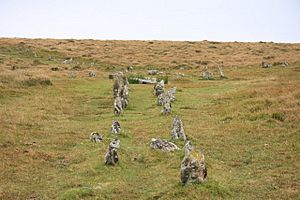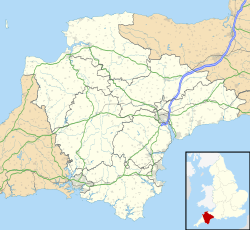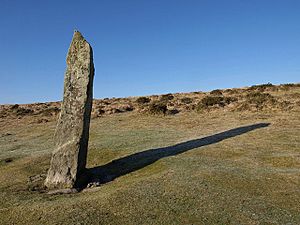Shovel Down facts for kids

Stone row on Shovel Down looking towards the Fourfold Circle
|
|
| Location | Devon |
|---|---|
| Coordinates | 50°39′25″N 3°54′14″W / 50.657°N 3.904°W |
| Type | Stone rows, stone circle, standing stones |
| History | |
| Periods | Bronze Age |
Shovel Down is a special place on Dartmoor in Devon, England. It is famous for its many ancient stone structures. These structures are called megaliths, which means "large stones."
At Shovel Down, you can find the remains of several stone rows. These are long lines of stones placed by people long ago. There is also a unique stone circle called the Fourfold Circle. You can also see several tall standing stones standing alone.
Contents
Exploring Shovel Down's Stone Rows
The stone rows at Shovel Down are found on the northern and southern sides of a wide, open hill. These ancient lines of stones were likely built during the Bronze Age. The Bronze Age was a time in history when people started using bronze tools. This period was roughly from 3300 BC to 1200 BC.
At Shovel Down, you can see about five double stone rows. These are lines of stones with two rows running side by side. There is also one single stone row. Other ancient monuments from the Bronze Age are nearby. These include the Fourfold Circle, the Long Stone, the Three Boy's Stone, and several cairns. Cairns are piles of stones, often used as burial mounds.
The Mysterious Fourfold Circle
The Fourfold Circle is a very interesting part of Shovel Down. It is made up of four stone circles, one inside the other. Imagine a target with four rings!
- The biggest circle is about 9 meters (30 feet) wide.
- The next circle is about 6.4 meters (21 feet) wide.
- The third circle is about 4.7 meters (15 feet) wide.
- The smallest circle is about 2.4 meters (8 feet) wide.
Inside the Fourfold Circle, there is a mound covered with grass. This mound once held a stone box called a cist. A cist was a small stone chest used for burials. Sadly, this cist has been disturbed over time.
The Long Stone: An Ancient Landmark
The Long Stone is a tall standing stone at Shovel Down. It stands right in the middle of two stone rows. This stone has been an important landmark for a very long time.
People have known about this stone for centuries. In a document from the year 1240, it was called the "Langstone." Today, the Long Stone helps mark the boundary of three different local areas called parishes.
The Three Boys Standing Stone
The Three Boys standing stone is another important stone at Shovel Down. It marks the southern end of one of the stone rows. This stone is the only one left from a group of three stones. The group was known as the "Three Boys."
It is believed that the other two "Boy" stones were taken away. People probably used them as gateposts for fences or fields.



